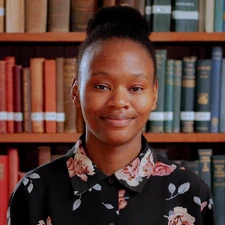Sinelethu Hashibi

The 2024 Katia and Maurice Krafft Award is awarded to Sinelethu Hashibi for pioneering work developing accessible geoscience educational resources that fill a vital need, translating complex concepts into more understandable language for under-served audiences.
Sinelethu Hashibi is awarded the 2023 Katia and Maurice Krafft Award for her truly exceptional work increasing diversity and accessibility in geoscience education. Hashibi has become a passionate advocate for enriching Science, Technology, Engineering and Math (STEM) learning, especially amongst disadvantaged youth who face systemic obstacles. Her groundbreaking PhD research focuses on creating innovative curriculum and teaching materials that make highly complex geoscience concepts and terminology more understandable and engaging for non-English speaking students in under-resourced schools across South Africa.
Hashibi’s academic excellence and remarkable empathy shine through in her tireless efforts to reach diverse audiences far beyond the classroom. She has spearheaded multiple creative initiatives providing relatable STEM role models and inspiration to the next generation of women and people of colour, giving vital exposure to the promise of geoscience careers. Her science communication programs targeted at youth from disadvantaged backgrounds are enriching lives and bringing excitement to learning. Supporting letters highlight Hashibi’s enormous resilience in the face of challenges, outstanding work ethic, and truly remarkable early career impact. Her pioneering efforts to decolonise and diversify geoscience education are laying absolutely vital groundwork, although the full fruits of her initiatives may not be seen for years to come.
By celebrating her stellar achievements with this award, the EGU recognises Sinelethu Hashibi’s current monumental contributions and strongly encourages her in continuing her efforts engaging under-served communities around the world. She exemplifies the highest levels of excellence and dedication in engaging new audiences in the geosciences. It is tremendously promising and inspiring to see such a overwhelmingly strong nomination arising from the Global South, where her work is so urgently needed, and while she is still an early career scientist, Hashibi has already made absolutely remarkable strides in her outreach and boundary-pushing research.
